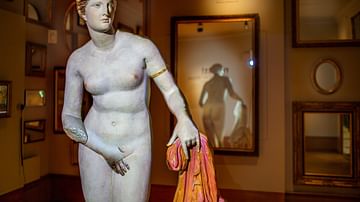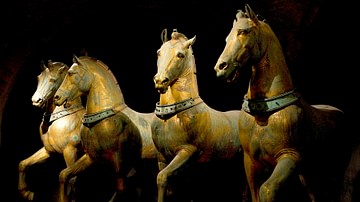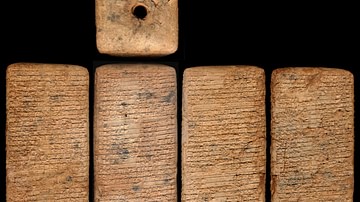Search
Did you mean: Hermes?
Search Results

Article
Mythological Re-Enactments in Ancient Roman Spectacle
To this day the ancient Romans remain infamous for their dramatic use of spectacle and other forms of entertainment. A lesser known variation of Roman spectacle is the mythological re-enactments that took place during the ludi meridiani (midday...

Article
Alexander the Great: A Case Study in Martial Leadership
History is not predictable; in many ways it can take on a life of its own. But sometimes, an individual's sheer presence is enough to bend history to his will. One such individual was Alexander the Great. Through his conviction, vision, mental...

Interview
Interview: Nudity in the Ancient World
The nude figure is a universal visual theme, deeply rooted in the history of art, and it is seemingly ubiquitous in the art of the ancient civilizations of the Near East and Mediterranean. The Antikenmuseum, in Basel, Switzerland, recently...

Article
The Hippodrome of Constantinople
The Hippodrome of Constantinople was an arena used for chariot racing throughout the Byzantine period. First built during the reign of Roman emperor Septimius Severus in the early 3rd century CE, the structure was made more grandiose by emperor...

Article
Kesh Temple Hymn
The Kesh Temple Hymn (c. 2600 BCE) is the oldest work of literature in the world, sometimes referenced as the oldest extant religious poem. It is a Sumerian praise song to the goddess Ninhursag and her temple in the city of Kesh, composed...

Article
The Legendary Settlement of Iceland
It is said that the early Norse settlers of Iceland in the Viking Age (c. 790-1100 CE) believed it was the home of the gods because of the tale of the creation of the world in Norse religion. In the time before time, the story goes, there...

Article
Falling Star
Falling Star is a Cheyenne tale of the great hero Hotoketana'ohtse ("Falling Star") who came from the heavens to stand up for those who could not defend themselves, slay monsters, and save the people from starvation. The hero-from-heaven...

Article
Pericles & the Restoration of the Athenian Agora
The agora of Athens developed from the 6th century BCE until it was destroyed in the Persian invasion of 480 BCE. Afterwards, the statesman Pericles (l. 495-429 BCE) used funds from the Delian League to restore it as the physical manifestation...

Article
Gilgamesh and Huwawa
Gilgamesh and Huwawa is a Sumerian poem relating the expedition of Gilgamesh and Enkidu to the Cedar Forest and the slaying of the monster-demon Huwawa. The work predates and informs The Epic of Gilgamesh in which the death of the monster...

Article
Temple of Castor & Pollux
The Temple of Castor and Pollux in the Roman Forum of Rome was erected in the final decade of the 1st century BCE, replacing the earlier temple to the twin sons of Jupiter which had stood on the site since 484 BCE. Today only the inner concrete...